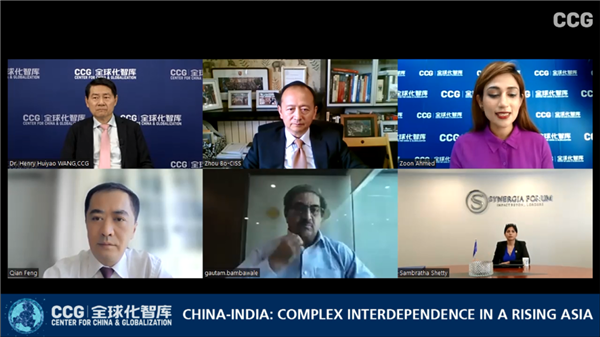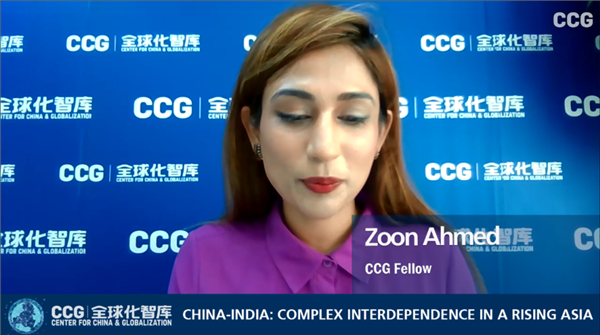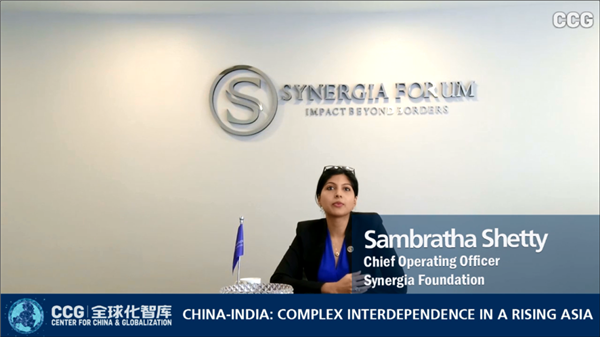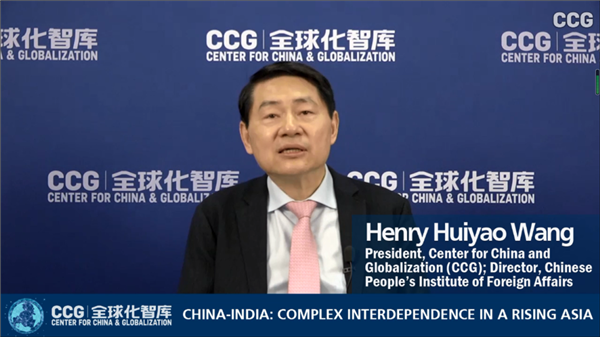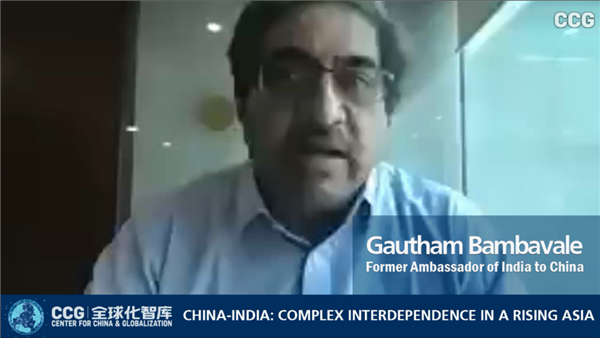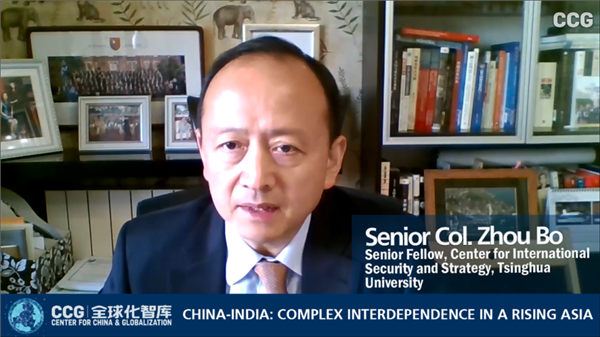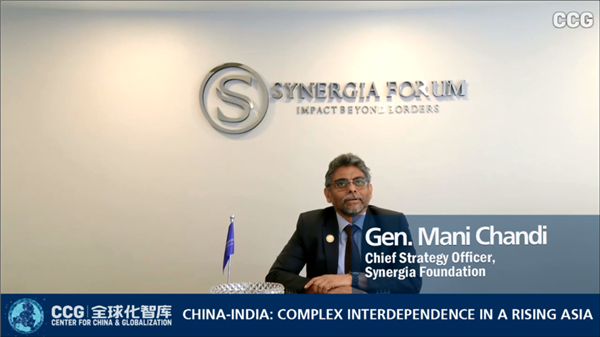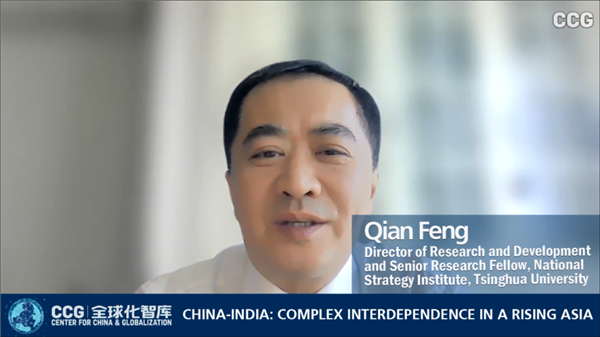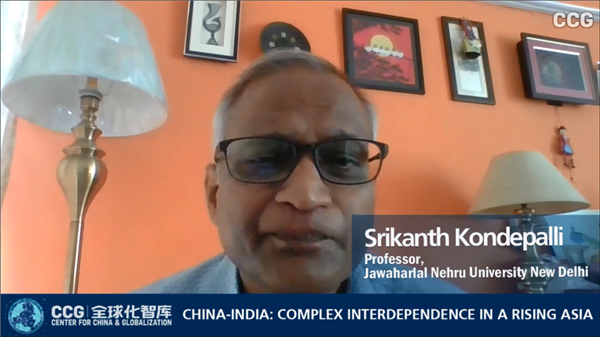Chinese and Indian experts emphasize the importance of rebuilding trust and promoting regional development
August 10 , 2022[English]
[Chinese]
On 10 August, CCG, in collaboration with the Synergia Foundation, hosted a dialogue on China-India relations. Since the outbreak of the COVID-19 pandemic and border clashes in May 2020, China and India have entered a new phase of complex interdependence and mistrust but also deepening and diversified cooperation.
Two of the most populous countries on earth, China and India achieved a new level of bilateral trade and are spearheading the trend toward multilateralism. While there is still misunderstanding and friction between the two countries, both Beijing and New Delhi’s firm stance against bloc politics that has become rampant in the wake of the Ukraine Crisis, as well as the upcoming face-to-face meetings between leaders of the two sides, providing a new opportunity to revive the “Wuhan Spirit”.
The event was moderated by CCG Fellow Zoon Ahmed and both Gautham Bambavale, the former Indian Ambassador to China, and CCG President Dr. Henry Huiyao Wang delivered keynote speeches. The panelists included Zhou Bo, Senior Researcher at the Center for International Security and Strategy Tsinghua University; Gen. Mani Chandi , Chief Strategy Officer of Synergy Foundation; Qian Feng, Director and Senior Researcher of the Research and Development Department of the National Institute of Strategic Studies at Tsinghua University; and Professor Srikanth Kondepalli of Jawaharlal Nehru University, New Delhi.
In her opening remarks, Sambratha Shetty, Chief Operating Officer of the Synergy Foundation, discussed the international situation and new array of complications that have since developed. She emphasized the importance of maintaining a long-term sustainable partnership between China and India and expressed her hope that both countries could seize new opportunities for cooperation as conditions evolve. She also said that finding new ways to strengthen people-to-people exchanges in academic, cultural and other fields in order to enhance mutual trust and resolve existing gaps in communication is also vital. She welcomed the participation of all the experts on behalf of the organizers, and expressed the hope that the event would contribute to a spirit of peace and cooperation in Sino-Indian relations, and fruitful developments in future stages of globalization.
The importance of bilateral cooperation
CCG President Wang Huiyao delivered a keynote speech in which he emphasized the importance of the Chinese and Indian civilizations, which have a long history of exchange that has existed since ancient times. At present, China and India are the two largest developing countries and emerging economies in the world. Combined, these countries countries represent three billion people and can contribute important concepts in the development of bilateral relations, and offer valuable guidance for the common development of the Asia-Pacific region. While the relationship between both countries is currently facing some setbacks, they continue to share mutual trust and understanding, and significant commonalities. He further elaborated that both China and India have future-oriented economic development goals as well as broad cooperation and development potential in trade and investment platforms such as the WTO, AIIB, and BRICS New Development Bank. China and India also take the same peaceful position on a number of international issues and maintain regional and global stability under the framework of the United Nations and the Shanghai Cooperation Organization. Lastly, he underscored that both countries can learn from each other on practical fronts including urbanization, digitization, informatization, and sustainable development, and therefore can help the world towards the track of peace and stability through effective dialogue and meaningful communication.
In another keynote speech, former Indian ambassador to China, Gautham Bambavale, discussed how China and India have been developing good relations based on mutual trust since the 1950s. Today, as bilateral communication and exchanges face a new range of challenges, it is necessary to maintain dialogue. Stable development, mutual trust and cooperation between China and India are crucial to the stability and development of Asia and the world at large. Both countries need to continue to remain steadfast in implementing the “Wuhan Spirit” in order to enhance mutual trust and cooperation, while promoting the development of bilateral relations. In looking at the future, both sides need to establish a more institutionalized and systematic approach to avoid misunderstandings, resolve conflicts, and strive to further broaden towards a cooperative and mutually fruitful relationship.
Rebuilding bilateral trust
Zhou Bo, a senior researcher at the Center for International Security and Strategy at Tsinghua University, believes that at present, China-India relations still face a number of challenges such as border issues as well as changes in the international environment. The development of China-India relations requires both sides to explore new ways forward, seek new methods, and to implement the existing principles agreed upon internationally. Both countries need to avoid unilateral thinking, remain receptive towards the overarching global developments, build a regional consensus, and pursue broader common interests. As the countries formulate national strategies in the face of global instability, China and India need to maintain strategic focus and act as cornerstones of regional and world peace and stability.
Gen. Mani Chandi, Chief Strategy Officer of the Synergy Foundation, emphasized the fact that China and India are both ancient civilizations and independent sovereign countries, and boast enough capacity and wisdom to find innovative ways to handle their bilateral relationship. In resolving border conflicts and other issues affecting bilateral relations, China and India need to work hard to find common solutions acceptable to both sides. Both countries need to abandon the logic of unilateral thinking and a zero-sum mentality, and instead seek ways to achieve more common interests through a win-win approach. In specific areas of controversy, targeted dialogue agendas can be set separately and discussed openly and honestly.
Qian Feng, Director and Senior Researcher of the Research and Development Department of the National Institute of Strategic Studies of Tsinghua University, discussed how China-India relations are currently going through a particularly difficult period with a lack of sufficient mutual trust and face complex challenges such as border issues. Under the current scenario, both countries should view and handle bilateral relations from a long-term perspective and a win-win attitude. Although there have been some positive changes in China-India relations recently, more effective and concrete efforts are still needed. He added that the Chinese side has always stressed that the spirit of consensus and friendship between China and India continue to dominate the bilateral dynamic and conflict is only a very small part of the overall relationship. Both sides need to examine history together, follow trends in historical development, and push bilateral relations forward proactively.
Srikanth Kondepalli, Professor at Jawaharlal Nehru University in New Delhi, discussed China and India’s role as major economies in the world, how both countries are economically interdependent and people-to-people exchanges remain frequent. Cooperation between the two sides is imperative. However, there are still specific disputes between China and India on regional economic cooperation plans, trade, and tariffs; unresolved issues need more time and effort to be resolve. He further added that the degree of economic interdependence between the two countries has also been affected by changes in the global environment, specifically Sino-US relations, but that there is still room for adjustment and improvement. Economic interdependence between China and India must be reciprocal rather than one-sided, and it is essential for both countries to work together to eliminate uncertainties and maintain and develop bilateral relations within the framework of mutually agreed principles.
During the interactive question and answer session, experts agreed that the future development of Asia’s economy is promising, and China and India need to share responsibilities, explore common interests and space for cooperation, and pursue people-centered development. This, in turn, will undoubtedly contribute positively to regional and global development.
More about CCG on China-India Relations
Centre for China and Globalization (CCG) has been long committed to conducting in-depth research on China-India relations, regional development, and actively participates in and promotes exchanges and discussions among experts in a range of fields. In December 2018 and May 2019, CCG, in collaboration with UNDP and the Himalayan Consensus Institute, held two “Silk and Spice Road” dialogues in Beijing, which were attended by a number of high-profile individuals including former Indian Foreign Secretary and former Indian Ambassador to China Nirupama Rao. Dozens of Chinese and Indian foreign policy and global governance experts discussed and exchanged their views on China-India relations, China-India cooperation, opportunities and challenges that both countries face, and how to enhance future cooperation. In May 2020, on the anniversary of 70 years of diplomatic relations between China and India, CCG and the Synergia Foundation jointly held an online forum themed “Trends in China-India Relations during the Pandemic and Its Impact on the Future of Asia”.
